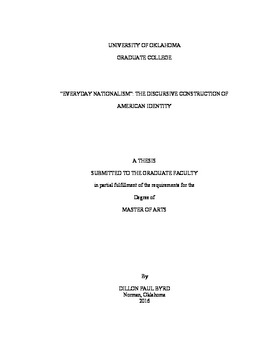| dc.contributor.advisor | Johnson, Tyler | |
| dc.contributor.author | Byrd, Dillon | |
| dc.date.accessioned | 2016-05-10T13:24:54Z | |
| dc.date.available | 2016-05-10T13:24:54Z | |
| dc.date.issued | 2016-05-14 | |
| dc.identifier.uri | https://hdl.handle.net/11244/34593 | |
| dc.description.abstract | In the last century, a large body of scholarship has emerged on the subject of American national identity. I contend that another way of understanding what it means to be American might be found using the “everyday nationalism” approach, which examines quotidian, social practices in day-to-day life that produce and reproduce the nation. This paper specifically examines the ways in which the “everyday nationalism” approach allows researchers to understand how American national identity might be discursively constructed. This research also aims to correct for the possibility that researchers might accidentally “nationalize” participants through survey designs that impute a sense of national identity on to their research subjects. Findings from semi-structured interviews and participant observation experiences with residents of the Oklahoma City, Oklahoma metropolitan area suggest individuals possess conceptions of being American commonly found in existing literature, but these themes emerge in nuanced ways. Findings suggest that ordinary Americans have a difficult time defining what it means to be American but still possess a strong attachment to the identity. There also appears to be a strong relationship between how one discursively constructs being American and how one confronts issues about refugees, immigration, and foreign policy. Evidence also indicates that ordinary individuals and elites use a multi-identity approach that activates salient identities in an instrumental way to legitimate discourse.
The research agenda pursued here aims to provide another look at what it means to be American by combining a comparative politics approach to a subject that has been discussed at length in the field of American politics. Findings from this study continue to lend support for the use of the “everyday nationalism” approach by researchers studying national identity and for comparative scholars interested in studying the ways in which different identities can be fluidly activated and switched between. Additionally, these findings confirm arguments in the American literature (Schildkraut 2007; Schildkraut 2011; Smith 1997; Theiss-Morse 2009) about what constitutive norms are present among those possessing American national identity, but they do suggest that these norms should not be seen as bounded categories, as they are both varied in meaning and importance among individuals. | en_US |
| dc.language | en_US | en_US |
| dc.subject | Political Science, Nationalism, Identity, Discourse Analysis | en_US |
| dc.title | "EVERYDAY NATIONALISM": THE DISCURSIVE CONSTRUCTION OF AMERICAN IDENTITY | en_US |
| dc.contributor.committeeMember | Bracic, Ana | |
| dc.contributor.committeeMember | Szymanski, Ann-Marie | |
| dc.date.manuscript | 2016-05-02 | |
| dc.thesis.degree | Master of Arts | en_US |
| ou.group | College of Arts and Sciences::Department of Political Science | en_US |
